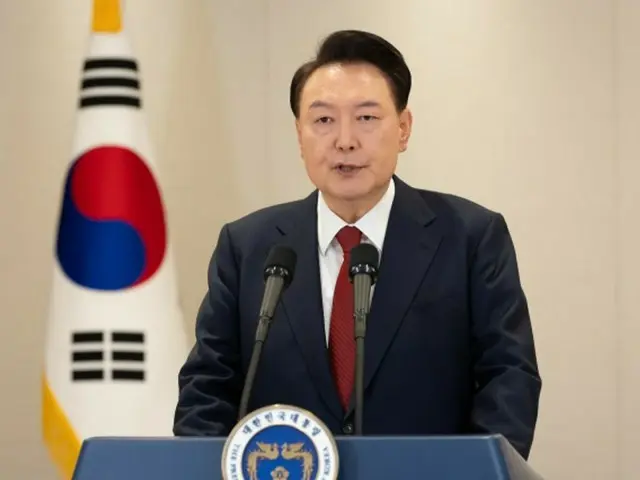The Constitutional Court will decide whether Yoon should be impeached, and if so, a presidential election will be held within 60 days. The incident began when Yoon declared a state of emergency late on the 3rd of this month.
In an emergency speech, Yoon said, "The legislative dictatorship of the Democratic Party of Korea is an obvious anti-national act that tramples on the constitutional order of the Republic of Korea and plots civil war," and called for the eradication of "anti-national forces."
The emergency martial law declared was the first since democratization in 1987. The emergency martial law declared by Yoon is a type of martial law stipulated in the South Korean Constitution and is used in times of war or natural disasters.
The President issues orders in the event of a military emergency such as a war, or to maintain public order. The military takes control of administrative and judicial functions, and is authorized to restrict freedom of speech, publication, and association.
After the declaration, armed soldiers of the martial law army broke the windows and rushed into the National Diet Building. A HYERI helicopter, believed to be a military aircraft, also flew over the National Diet Building. The declaration was issued in a situation reminiscent of the military regime.
Afterwards, many citizens gathered in front of the National Diet, chanting slogans against martial law and surrounding military vehicles, causing chaos.
However, martial law can only be lifted if a majority of members of Congress request it.
Immediately after the declaration, a plenary session of the National Assembly was held, and all 190 members in attendance voted in favor of lifting the state of emergency. Yoon lifted the state of emergency after just six hours.
Six opposition parties, including the Democratic Party of Korea, said Yoon had "attempted to suspend the constitutional order and seize power permanently."
On the 4th of this month, they submitted a motion to impeach Yoon to the National Assembly, citing violations of the Constitution, such as "the Constitutional Law of the People's Republic of Korea (PRC)." For an impeachment motion to pass, a two-thirds majority of the 300 members of the National Assembly must vote in favor.
All members of the Diet participated in the vote, and the impeachment bill was passed with 204 in favor, 85 against, 3 abstentions, and 8 invalid votes. A vote was also held on the 7th of this month, but this time most of the ruling party members left the plenary session,
The vote was rejected. The vote was not passed due to a lack of a quorum, and the impeachment bill automatically fell through. To pass the bill, more than eight members of the ruling party must vote in favor, and this was the focus of the vote on the 14th.
The ruling People Power Party decided to oppose the impeachment motion as party policy, but it appears that 12 members voted in favor of it. The last time a presidential impeachment motion was passed was in 2004, when Roh Moo-hyun was impeached.
Following the passage of the bill, Lee Jae-myung, leader of the main opposition Democratic Party, said, "I congratulate and thank you for your victory in the first round. I hope that the people of this country will continue to support the people of this country."
The president has the powers of command of the armed forces, the right to veto bills (and the right to request reconsideration), the right to propose and promulgate constitutional amendments, the right to promulgate legal amendments, the right to submit budgetary proposals, and executive and legislative powers.
However, following the passage of the impeachment bill, Yoon cannot exercise these powers. He is also not allowed to convene cabinet meetings or take responsibility for government affairs, such as hearing reports from or issuing instructions to government agencies.
The title "President Yoon Seok-yeol" will remain the same. Presidential honors such as security will remain unchanged, and he will continue to live in the presidential residence.
The Constitutional Court will decide whether Yoon should be removed from office within 180 days of receiving the National Assembly's resolution.
The prosecution is investigating the matter on suspicion of civil unrest, and the South Korean newspaper JoongAng Ilbo reported that "President Yoon is expected to remain in the official residence and conduct investigations and legal studies in preparation for the impeachment trial."
Yoon issued a statement immediately after the bill was passed, saying, "We will pause for a while, but we must not stop on the journey to the future that we have been walking together with the people for the past two and a half years," and "I will never give up."
"I will cherish all the criticism, encouragement and support I have received, and do my best for the country until the very last moment," he said, concluding, "I believe in the underlying strength of our people.
"Let us all gather our strength for the freedom, democracy and prosperity of Korea," he said. Prime Minister Han will act as president. "In these difficult times, I will focus on stabilizing national affairs," Han said.
"We will exert all our efforts and efforts to manage the situation," he said. In an editorial on the 15th, the South Korean newspaper Hankyoreh pointed out that "the National Assembly must take the lead in sorting out the chaotic political situation following the passage of the impeachment motion."
"The Diet must cooperate with the government to stabilize the people's lives and the economy, which are facing a crisis, and respond swiftly to the severe diplomatic and security situation," he said.
2024/12/16 14:34 KST
Copyrights(C)wowkorea.jp 5

